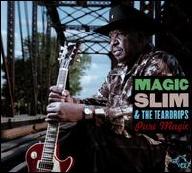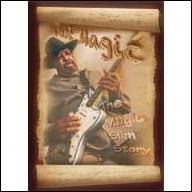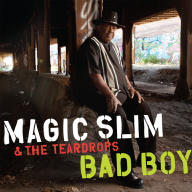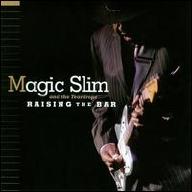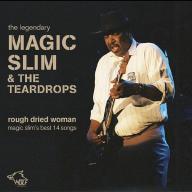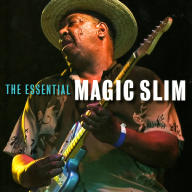So he retreated to Mississippi for a spell to hone his chops. When he returned to Chicago in 1965 (with brothers Nick and Lee Baby as his new rhythm section), Slim's detractors were quickly forced to change their tune. Utilizing the Teardrops name and holding onto his Magic Slim handle, the big man cut a couple of 45s for Ja-Wes and established himself as a formidable force on the South Side. His guitar work dripped vibrato-enriched nastiness and his roaring vocals were as gruff and uncompromising as anyone's on the scene. All of a sudden, the recording floodgates opened up for the Teardrops in 1979 after they cut four tunes for Alligator's Living Chicago Blues anthology series. After that, a series of tough-as-nails albums for Rooster Blues, Alligator, and a slew for the Austrian Wolf logo fattened Slim's discography considerably.
The Teardrops weathered a potentially devastating change when longtime second guitarist John Primer cut his own major-label debut for Code Blue, but with Slim and bass-wielding brother Nick Holt still on board, it became doubtful that the quartet's overall sound would change dramatically in Primer's absence. In 1996, Slim signed with Blind Pig and cut some of the most celebrated albums of his career, including Scufflin' in 1996, Black Tornado in 1998, Snakebite in 2000, and Blue Magic in 2002. A live recording taped in 2005 at the Sierra Nevada Brewery was released that same year on both DVD and CD as Anything Can Happen. Tin Pan Alley, a set of recordings made between 1992 and 1998 in Chicago and Europe, was released in 2006 by Austria's Wolf Records. Midnight Blues appeared in 2008, followed by Raising the Bar in 2010. Bad Boy, a collection of covers given the Magic Slim makeover, hit the streets in 2012. However, while on tour with the Teardrops in January 2013, Slim experienced breathing difficulties and was hospitalized first in Phoenixville, Pennsylvania and then in Philadelphia; he died there on February 20, 2013 at the age of 75. ~ Bill Dahl & Al Campbell, Rovi


